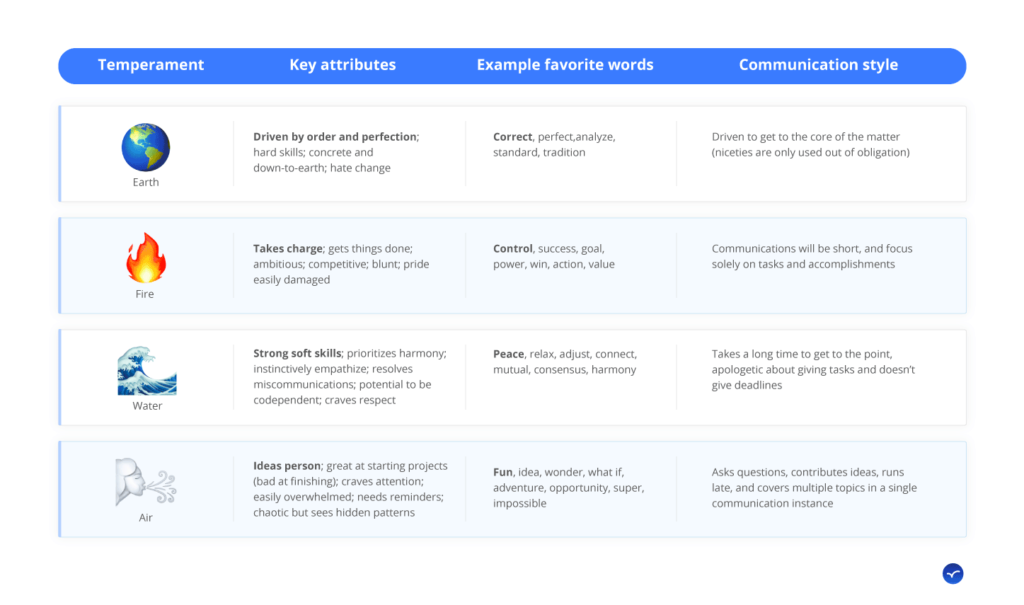Did you catch the recent Arc Dev virtual meetup on effective remote communication and why personality matters? If you missed it, don’t worry too much… we’ve got you covered.
During the meetup, remote-experienced Arc Dev (and Toastmaster) Jaymes O’Pheron shared a bunch of great tips on how to successfully communicate remotely in the workplace, as well as how customizing communications to personalities can help get your message heard.
Curious? We were too! Check out the meetup summary below.
Looking for top talent fast? See how Arc can help you:
⚡️ Find developers, designers, marketers, and more
⚡️ Freelance or full-time remote + fully vetted
⚡️ Save up to 80% with global hires
Hire top talent with Arc risk-free →
Words are emotional content vehicles
Have you ever stepped back and thought about the purpose of words? When you say something, more than one thing is expressed:
- First, there’s the word. This is the content of what you’re saying. In terms of emotional connection, this has a limited impact (Jaymes says it’s only around 7%!).
- The rest — the other 93% — is all vocal variety (38%) and body language (55%).
Think about it: it’s entirely possible to walk up to someone and communicate things without saying anything at all, just via posture, facial expression, etc.
What does this mean for written communications, such as email? You’re only working with 7% of the possible emotional bandwidth in your message.
Basically: online communication can be really challenging!
Read More: Developer Retention: How to Keep Your Software Developers Happy
Level up your engagement through emotional connection
Connection is important. It’s what turns a group of individuals into a team. If you’re a manager who is throwing tasks at individuals, without taking the time to establish these team bonds… well, you’re probably not going to get very far.
But merely seeing and hearing other people through a video call isn’t enough. It lags, and there’s no way to look at the camera and the other person on screen at the same time.
So what do you need to do? Figure out how to increase emotional connection in order to improve communication.
Good remote communication: intentional, active, focused & informed
Productivity boosts come from prioritizing communication modes that allow for greater expressiveness and engagement, says Jaymes. People should also seek to train in active listening/engaging skills.
What does this mean, and how do we do this? Let’s unpack these ideas below.
Are we speaking the same language?
Sure, two people might be objectively speaking the same words and using the same language. But are the meaning and intention behind their words exactly the same?
Unfortunately, no. The other person is never going to receive the exact same message as the one that left your brain!
What should we do if the intention and meaning behind our words can’t be 100% correctly conveyed? Keep working on connecting via the emotional language of your listener.
Read More: An Immersive Virtual Retreat Idea: Unpacking MURAL’s Playbook
Your emotional language of communication
Everyone has their own personal style of communication. Our personality patterns are what we rely on — subconsciously — when we filter and interpret what other people say. Having more diversity in thinking and communications leads to robustness within teams.
But this doesn’t mean you can’t learn new ways, and use new “lenses”, to listen. According to Jaymes:
What we need to do is learn how people think. We need to learn how to recognise how a particular person thinks — and how we think — and adjust the two so that they line up.
Jaymes O’Pheron, Arc software developer
(This isn’t all that different from two computers talking to each other over the same API!)
Personality as a communication tool
Have you ever done a personality test? Maybe it was Myers-Briggs or even a Hogwarts sorting hat. Either way, the outcome of this test was a personality profile.
But is this who we are? Jaymes says no: everybody has all the personality traits inside themselves, to one degree or another — just like skills.
People use these traits at different times and in different circumstances, as well as with a differing degree of familiarity. That said, these tests are a useful tool for gaining deeper insight into personality, and having a way to describe communication styles.
Certain personality traits aren’t inherently better than any others. The key is knowing to use the one that is most appropriate for the situation you’re in at the time.
Basically, know your own personality strengths and weaknesses so you can:
- Improve the weaker aspects of your personality, and
- Learn to recognize when to apply your skills.
Read More: How to Integrate Freelance Software Developers Into Your Current Team
Personality tests as a communication tool
Jaymes suggests that a useful way of thinking about personality is the classical “Four Temperaments”: Melancholic/Earth, Choleric/Fire, Phlegmatic/Water, and Sanguine/Air. It’s also useful to think about Extraversion vs Introversion, as well as Task-focus vs Relation-focus.
These personality descriptors aren’t a life sentence to a certain type of behavior; rather, they show how you are accustomed to behaving. But this doesn’t mean you can’t change!
Have you done one of these tests yourself? They can assist you with insights into your patterns of behavior. What about your team members — can you figure out what their test results might be? This might help you better communicate with them, especially when working together remotely.
Understanding others’ personalities helps remote communication
When you understand what makes someone else tick — what words, and ways of saying things, really resonate with them — it’s easier to communicate. According to Jaymes, you should seek to “use the words that work for them. And prioritize the prioritizations that matter to them.”
Jaymes ran us through examples of how understanding personalities can help us with communication — particularly through the use of their favorite words and by understanding their communication style. (These are summarized in the table below.)

Understanding other peoples’ personalities is also really useful for cross-cultural communication, as some cultures tend to favor certain communication techniques. In the meetup, Jaymes described the time that he, a Wind/Air type, had to draw on Fire-type techniques to keep an international project moving.
Read More: How to Create a Remote Work Culture That’s Supportive, Positive & Fun
Summarizing It All Up:
Thanks to Jaymes for his great Arc Dev meetup presentation! We learned a lot about how to tailor our remote communication style to more effectively engage with others.
In summary:
- Understanding others’ personalities helps you to communicate with them better.
- Figure out others’ communication styles so you can communicate with them in their language. Figure out the words and concepts that work for them, and show them respect in a way that they will recognize.
- While we can find ourselves in these personality types, we don’t want to identify with them.
- Understand the weaker aspects of your personality, then decide to strengthen and use these when it is appropriate.
- With online communications, never forget that there are people, not just words!
- Try to have a balance of temperaments on your team. See and acknowledge differences as complementary, and as value-adding opportunities if they’re harnessed correctly.
Do you have any other tips on how to effectively communicate with remote team members? Let us know in the comments below!
You can also try Arc, your shortcut to the world’s best remote talent:
⚡️ Access 450,000 top developers, designers, and marketers
⚡️ Vetted and ready to interview
⚡️ Freelance or full-time








